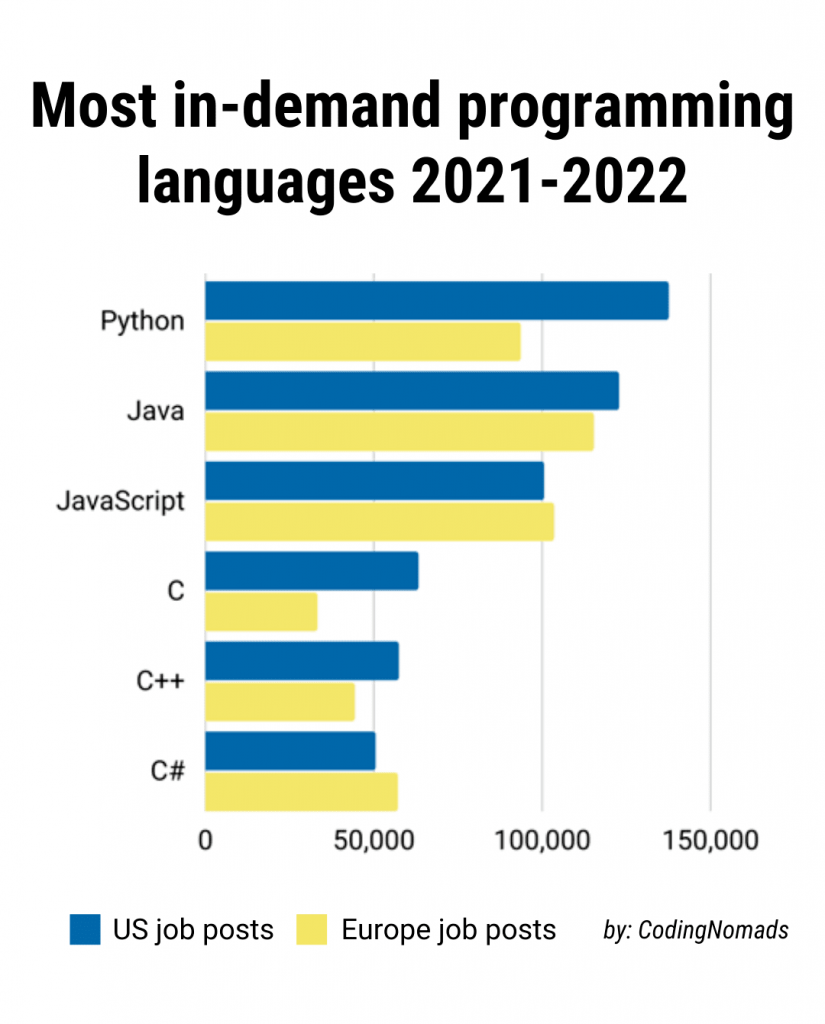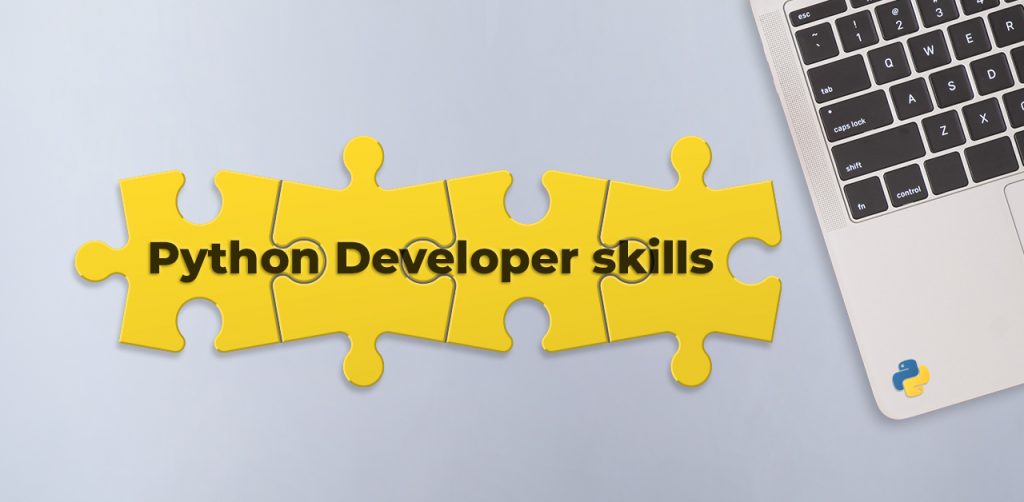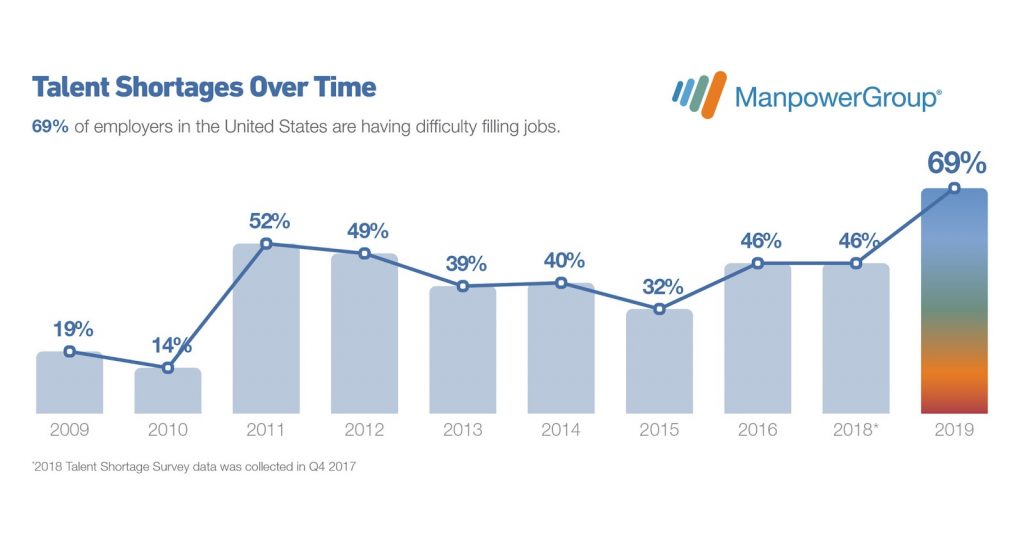With a market share of 48.24%, Python is the third most popular programming, scripting, and markup language in the world! Given this popularity, one may think that finding a trusted Python developer would be a piece of cake as companies would be drowning in Python developer resumes. After all, everyone would gravitate towards this hot technology, right?
Depends on who you’re asking!
According to PYPL (PopularitY of Programming Language), Python is one of the most sought-after skills with 27.85% of online users seeking Python tutorials. On the other hand, Python developers are the third most in-demand tech hires. In short, the demand for Python has far surpassed the available supply, especially in the aftermath of the global pandemic!
The demand-supply gap has made Python a lucrative option for those seeking a fulfilling career in tech. And with rising demand emerges the issue of substandard talent. Resultantly, recruiters and hiring managers are left separating grain from the chaff and observing every Python developer’s resume minutely.
If you are looking for an express guide that can cut short this labor, then you’ve come to the right spot! Here, we will discuss what a Python developer resume must contain and how you can analyze one.
Why Are Python Developer Profiles in Demand So Greatly?
The steep demand for Python developers can be attributed to several reasons such as its thriving community, ease of learning, support for vast libraries and frameworks, code readability, and more.
And while they do have a role to play in peaking this demand, it is the applicability of Python software development that truly puts it on the map. Python developer profiles feature prominently in key areas like:
- Web development
- Software or app development
- Automation
- Data Science and Scientific Computing
- Artificial Intelligence
- Machine Learning
- Natural Language Processing
- Image and Media Processing
- Blockchain development
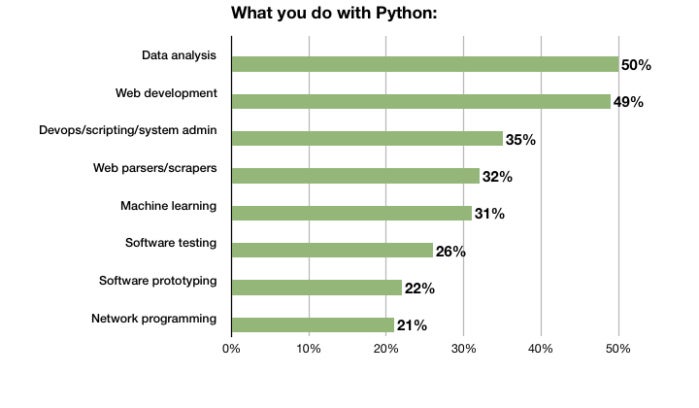
As such, businesses operating in the field of information technology (IT), banking, financial services and insurance (BFSI), healthcare, manufacturing, media and entertainment, aerospace, etc., resort to Python developers to fulfill their varying industry-specific needs. Against this backdrop, it comes as no surprise that big names like Google, Microsoft, Facebook, Netflix, Accenture, Spotify, and Dropbox often post job listings calling for Python developer resumes!
What a Perfect Python Developer Resume Looks Like in 2022
Seeing as how there are 193,000 Python developers on LinkedIn, finding the one that checks your boxes may seem daunting. And here’s where a Python developer resume would emerge as a key differentiator that plays a crucial role in clinching your interest.
Candidates often hit Google with the classic “What should a Python developer resume contain?” before going ahead and creating one for themselves. Some just find the easy way out and enter their details within the template of a Python developer resume. Others try too hard and stuff everything within the two-page Python developer resume.
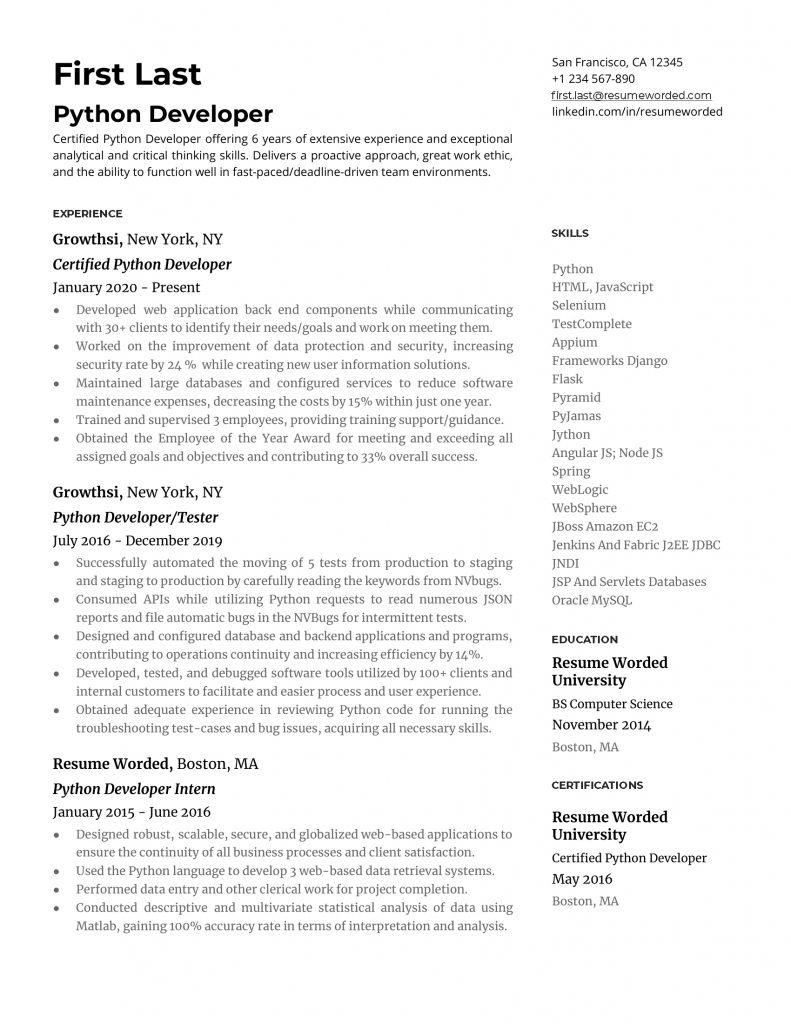
However, those applying for Python developer profiles must furnish the following details in their resume, and you as hiring managers should be scanning these modules while shortlisting.
Name and Contact Information
Let’s start with the obvious – the candidate’s name and contact details.

This critical information should be available right at the top of the Python developer resume and be legible. In fact, the first line of the CV should contain the first and last name, followed by contact details such as the telephone number and a (professional) email address. While a physical mailing address is no longer necessary, it may come in handy if you are hiring for a full-time, in-office Python developer profile.
Digital Python developer resumes allow job seekers to enrich this segment even more. They can now add a link to their website, social media handles (especially LinkedIn), and GitHub profile.
A Brief Summary Statement
Once the name and number are out of the way, the resume should then contain a summary statement. It is a brief overview of the candidate’s skill, experience, accomplishments, qualifications, and competencies – typically captured in a sentence or two. It may also touch upon the candidate’s career goals, their role as a Python developer, and how they envision contributing to the organization. This section often acts as a hook for recruiters and hiring managers.
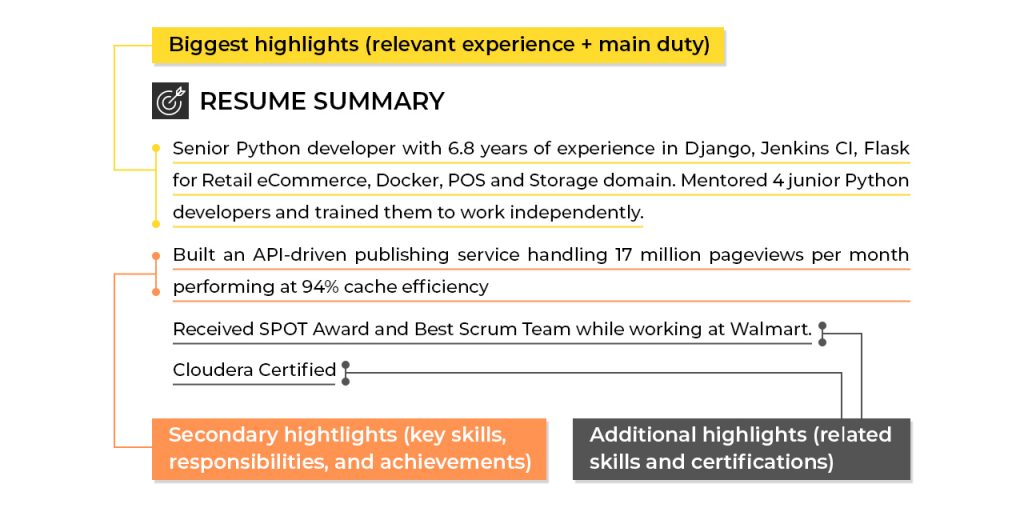
Python developer resumes that feature a well-thought-out and relevant summary statement would stand out more than other run-of-the-mill resumes. In fact, it exemplifies the candidate’s attention to detail as they may craft a summary statement that is in line with your company’s requirements. One can even say that this summary statement is the new cover letter!
Education and Certifications
Typically, most job seekers would have at least a Bachelor’s degree in Engineering or Computer Science or possess the requisite certifications while applying for a Python developer profile. However, it is not always the case. If anything, candidates having diverse educational backgrounds may be of greater value if this qualification is well-aligned with your organizational requirements. For instance, a certified professional in Python programming with a bachelor’s in mechanical engineering would be heaven-sent for a manufacturing company.

Apart from the title of their degree, the educational institute from where they have acquired the said degree may also make a world of difference. After all, a graduate from the Massachusetts Institute of Technology would carry greater weightage than someone from a no-name university!
Technical Skills for Python Software Development
Since we have already decoupled academic learning from the candidate’s prowess in Python, recruiters should keep their eyes peeled to detect technical skills that demonstrate the candidate’s eligibility for the job.
Look out for the following technical skills in a Python developer resume:
- Core Python – foundational knowledge of Python.
- Python Frameworks – Django, Web2Py, Flask, Bottle, etc.
- Python Libraries – TensorFlow, PyTorch, Numpy, Scikit Learn, etc.
- Basic knowledge of front-end technologies like JavaScript, CSS, HTML, etc.
- Object-Relational Mapping libraries like SQL, Django ORM, SQLAlchemy, etc.
- Python version control using Git, Apache Subversion, Mercurial, etc.
- Machine Learning, Artificial Intelligence, and Deep Learning
- MVC (Model View Controller) Architecture
Apart from the Python skills listed above, the resume may also highlight niche technical skills relating to problem-solving, data analytics, designing, testing and debugging, security, etc., specific to the listing.
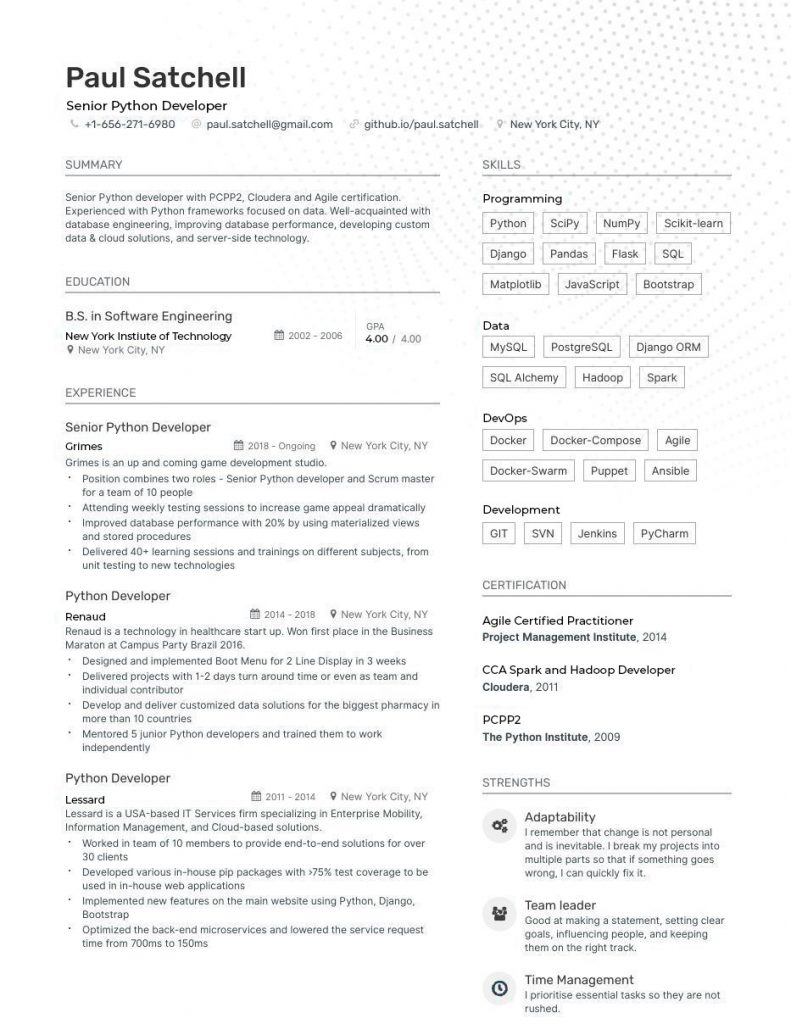
Soft Skills
While assessing the technical skills is rather cut and dry, recruiters must also account for soft skills required during Python software development. Communication, time management, creative thinking, teamwork, conflict resolution, dependability, and logical and analytical thinking are a few critical soft skills that should show up on a Python developer’s resume.
Work Experience
Finally, after having painted a picture of their skills and competencies, the Python developer’s resume should now back it up with relevant experience.
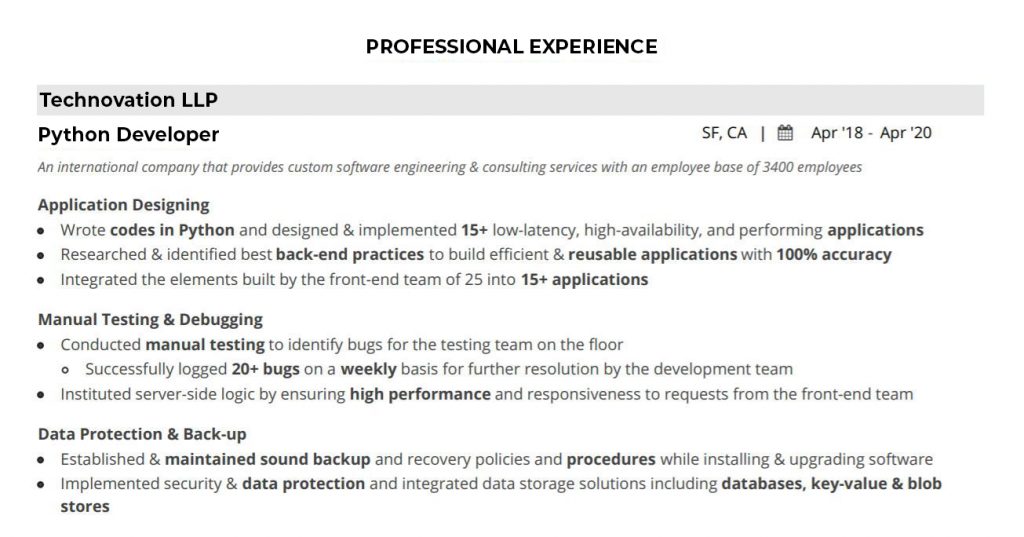
Ideally, the job seeker should have outlined their experience in a chronological and detailed manner. Further, this information should be fleshed out and quantified with essential inputs such as their roles and responsibilities, tenure, contributions, projects, achievements, learnings, etc. You may even corroborate these claims through a quick background check by contacting past employers.
Work Portfolio
As an appendix to the work experience, the candidate should also include a work portfolio in support of this claim. The portfolio should typically contain:
- Hiring company’s name,
- Date of project commencement and completion,
- The role of the Python developer,
- The tech stack used,
- Highlights or key achievements
Candidates are now getting innovative and offering static and dynamic website links to their portfolio where the recruiter can check out a live demo of their skills and competencies. Such an approach points to their technical skill and innovation, even if they have exercised it to create a portfolio of personal projects.
Top Nine Tips for Shortlisting the Best Python Developer Profiles Based on Resumes – The Traditional Approach
52% of talent acquisition leaders admit that shortlisting the right candidates is the toughest part of their job. If you belong to this majority, then don’t despair! We have a few tried and tested strategies that can help you breeze through the piles of Python developer resumes.
#1 – Follow a Template
As the Python developer resumes pour in from disparate sources, know that no two resumes would be alike – even if their contents are the same! The differences would be minor and imperceptible or stark depending on the effort put in by the candidate. However, as the good saying goes, you cannot compare apples with oranges.
As such, a template can act as an equalizer to assess every Python developer’s resume. You may even refer to your job advert to prepare a checklist as it would anyway capture the essential and desirable skills required for the role. You can even ascribe weightage to every qualification depending on its importance.
Such an approach will allow you to compare and measure even the most dissimilar Python developer resumes.
#2 – Be a Grammar Maven
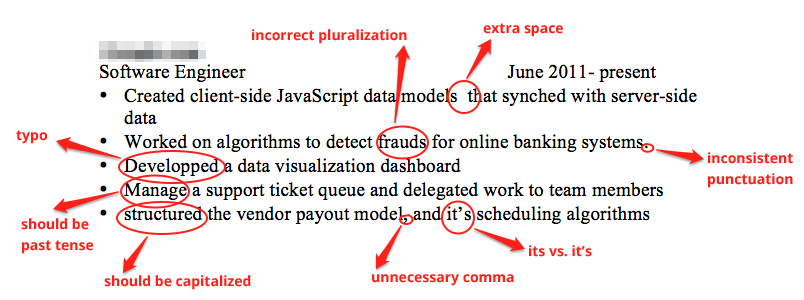
Given the fact that this Python developer resume would be your first point of contact with a candidate, do not settle for anything less than perfect. Remember, even though the Python developer profile is that of a technical position, there is no harm in expecting error-free and grammatically sound resumes. After all, their ability to proofread the resume illustrates their “attention to detail” or “ability to debug codes.”
Similarly, other unprofessional red flags must also push the Python developer resume into the ‘Reject’ pile.
#3 – Cover Letters Aren’t Dead (Yet)
Before you roll your eyes at a candidate who has written a cover letter along with the Python developer resume, stop and give it a go over.
While the practice may be obsolete and dated, it displays how the candidate is willing to go above and beyond to bag the job. And even if you do not refer to it in the first instance, you can circle back to it later if you need further clarification. So, even if you have made it optional, appreciate the effort that may have gone into crafting the cover letter.
Unless, of course, where you have explicitly mentioned that cover letters are not necessary, then, by all means, reject the candidate for not following instructions!
#4 – Provision Your Time Evenly
As a recruiter, you will have to walk the fine line between digging deep into the Python developer resumes or skimming through them superficially. The best way to make the most of your time is to dedicate a fixed amount of time per resume before you file it under the accept, maybe, reject categories. In doing so, you would be giving every resume a fair shot and minimizing bias. The only possible deviation from this timeline should be when you analyze a resume with the clear intent of screening it out given the glaring red flags.
#5 – Prioritize Scannability
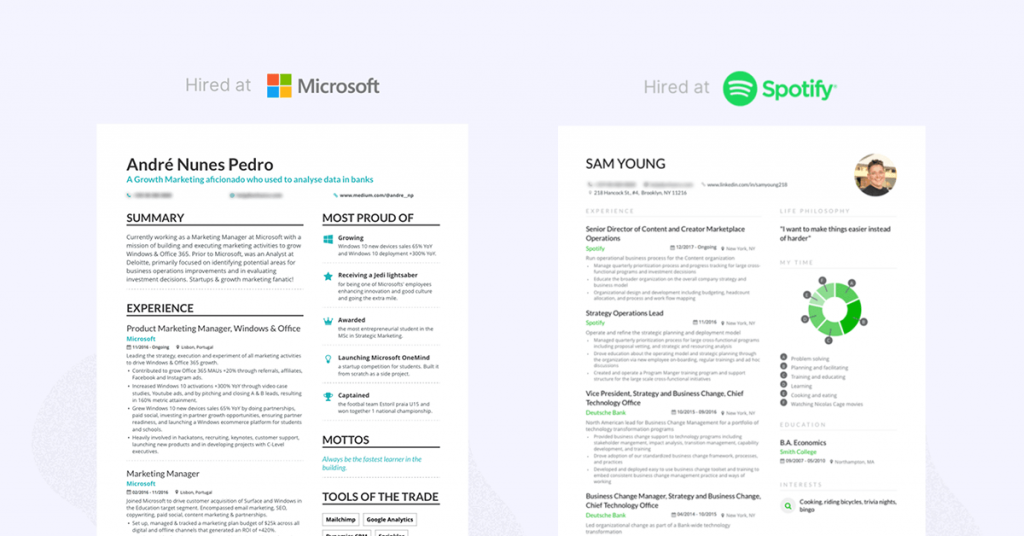
Speaking of time, it is known that recruiters spend an average of 7.4 seconds per resume. Against this backdrop, a Python developer resume that is divided into clear and logical subheads would be easier to evaluate than a wall of text. Formatting such as marking keywords in bold and presenting information in bullets would further reduce the cognitive load involved in assessing the resume. Such tweaks are a sign of a reliable developer as it indicates that they understand the pain points of their target audience!
#6 – Go Beyond Keywords
Seeing the keywords from your job listing reflected in the Python developer resume can be reassuring. Why shouldn’t it? It indicates that the job seeker has meticulously gone through the ad. However, most candidates have now figured out the hack of echoing buzzwords from adverts to make a lasting impact. As such, you may have to look past this noise to seek candidates with hands-on experience.
#7 – Seek Relevance and Recency
We have already covered in detail the technical skills that you might expect for a Python developer profile. Feel free to use these, along with experience, as the basis for assessing the candidate on whether or not they are fit for the role that you have advertised.
Remember, relevance and greater alignment would any day trump other traits required during Python software development.
#8 – Perform Fact Checks
As much as you’d hate it, not all candidates would be honest in their resumes. After all, the malpractice of inflating one’s skill or experience is not unheard of. Sources suggest that nearly 78% of candidates lie on their resumes and most of them get away with it!
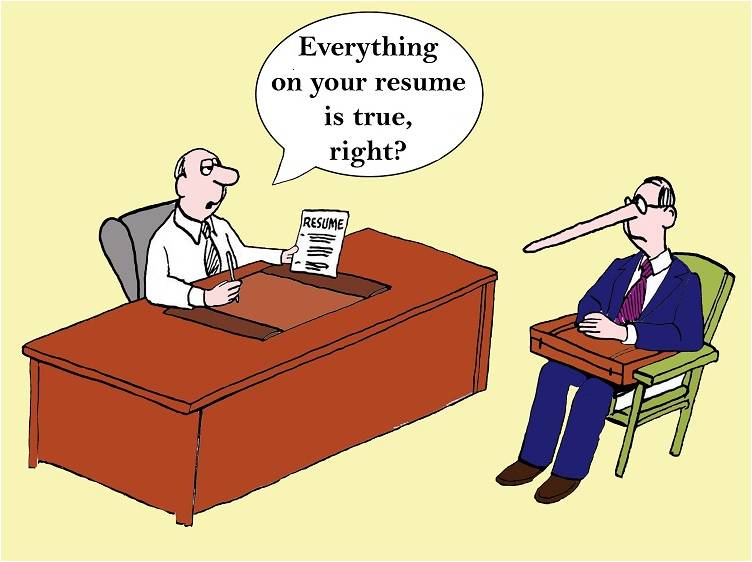
Obviously, you cannot fact-check every Python developer resume that ends up on your table. But you can draw from your expertise to mark those that could be advancing but also sound too good to be true. Then, it is only a matter of hopping on the candidate’s LinkedIn to check veracity.
#9 – Leverage Technology
Thanks to the advancements in technology, resume screening and shortlisting have become a lot more effortless. Modern-day Application Tracking Systems (ATS) come equipped with AI-powered tools that can take care of all the grunt work and offer you finished results. However, do bear in mind that at the end of the day, it is still a technology with its fair share of loopholes. And given that this is a technical role in question (particularly that dabbling in AI/ML), miscreants might find ways to befuddle the system!
Uplers Talent Solutions: The Smarter Way to Hire Talented Python Developers
At Uplers, we follow a talent-based approach to hiring. As a result, we act as the bridge that couples the perfect candidate and the company in need of the same.
This skill-first hiring model is made possible using our strategic inverted pyramidal resume shortlisting style designed by our hiring experts. And the same applies in the case of screening and hiring Python developers as well.
Think of this talent pyramid as a funnel where the candidates trickle-down based on your requirements. It involves the following steps:
- First, we filter the candidates based on the high-level skills required for the job. Our clients often share with us a list of the must-have and the nice-to-have skills that they expect from their Python developer candidates. For instance, knowledge of Python is a must but a Python developer who has a strong understanding of front-end technologies and web frameworks would be a suitable fit for companies looking to develop web apps. On the other hand, companies looking to build a custom business solution powered by AI would seek someone who has a grasp of Artificial Intelligence, Machine Learning, Deep Learning, etc. Resumes that mirror these skills make it through, while the rest are weeded out.
- Once those eligible on the basis of their skills and competencies enter the next stage of assessment, we check out their past experiences. Rather than simply focusing on the number of years or the number of clients that represent the experience, we analyze the diversity of work – that is, the level of exposure that they enjoy, how does their previous experience aligns with the company’s current goals, have they worked on a similar project for a similar industry before? Such questions allow us to make a well-rounded qualitative decision on how their experience would fare in real-life conditions while they work on your project. A good number of resumes are screened out during this phase.
- By now, we are left with just a handful of candidates who check almost all business boxes. As such, we put their claims to the test by conducting a series of technical assessments. These comprehensive tests will examine the candidate’s ability to tackle technical issues, devise out-of-the-box solutions, and solve real-world problems. It will also lend insight into their style of work and whether their tech stack matches that used by the business. Each test will yield a scorecard, based on which the candidates will be prioritized. A succinct yet detailed report on the candidate’s resume and performance will be prepared for all qualified candidates and shared with the companies.
- Finally, companies can pore over the information that we have shared and make a well-rounded decision on which candidate would be suitable to augment the workforce of their organization. If necessary, we may even schedule interviews with the candidates at the company’s behest. Such interactions will help adjudge better as to whether the candidate is a good cultural fit or otherwise. Only when the client is absolutely satisfied with the Python developer, would we proceed to the talent onboarding stage.
As you can see from above, companies primarily feature only in the last stage of talent engagement, while Uplers does the rest of the Python developer resume screening tasks. The funnel effectively passes only the eligible and qualified candidates – Similarly to how your marketing teams qualify leads and pass them on to sales! And as business leaders, you already know that the better your marketing team is at their job, the better sales will perform. Against this backdrop, who can be a better talent enabler than Uplers?
Ready to Get Started With Python Software Development?
Clearly, screening all the Python developer resumes is a lot of work – and that’s just the first stage of the recruitment process. As a result, you will be spending a lot of time, money, and resources in ensuring that you make a smart hiring decision.
If you simply wish to bypass this costly and rigorous process and focus simply on Python software development, might we suggest hiring an agency to take care of such administrative tasks?
You can also seek help from our talent sourcing platform of Uplers, where you can get access to the top 3.5% of the talent pool without breaking into a sweat (or your bank)! Plus, you safeguard your project from the perils of outsourcing it while also enjoying the benefits of having a dedicated Python developer. We have already offered an overview of how the process takes place, and you know that it sounds too good to be true – but it is as true as it can be. So, if you can get the best of worlds, what is stopping you from taking a slice out of it?


